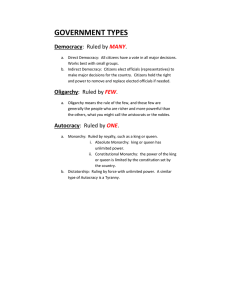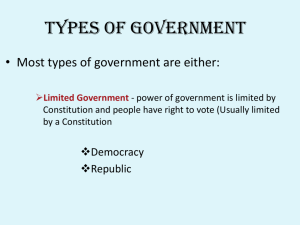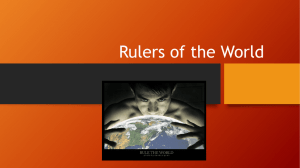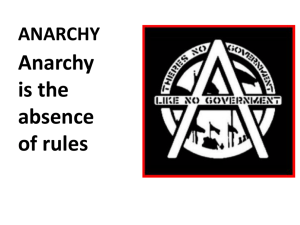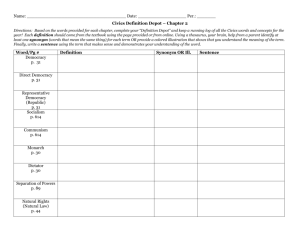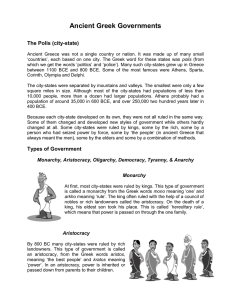The Rise of Democracy Activity1
advertisement
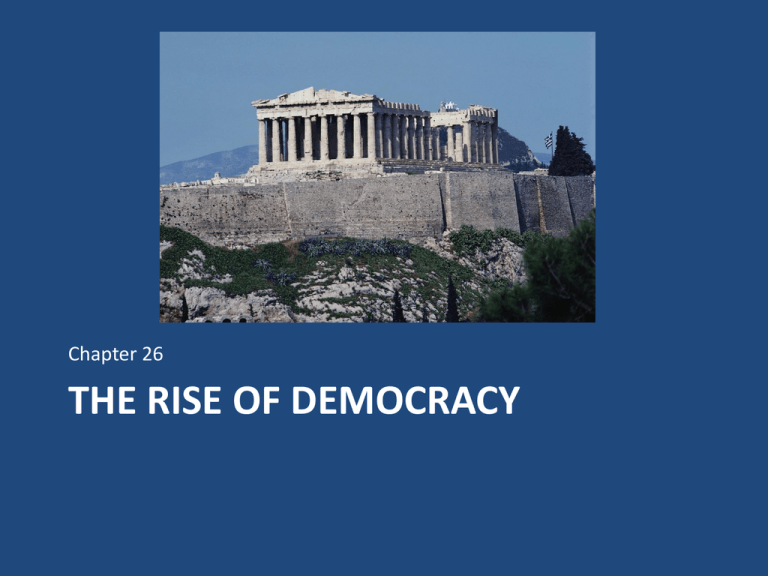
Chapter 26 THE RISE OF DEMOCRACY What is a City-State? An early city that was like a small, independent country with its own laws and government. MONARCHY Ruled by a king: Some city-states were ruled by a king. This type of government is called a monarchy. The citystate of Corinth is an example; Corinth was ruled by a king. OLIGARCHY •Ruled by a small group: Some city-states were ruled by a small group of people. This type of government is called an oligarchy. The city-state of Sparta was ruled by a small group of retired and highly respected warriors. Tyranny •"one who rules without law, looks to his own advantage rather than that of his subjects, and uses extreme and cruel tactics—against his own people as well as others". •“During the seventh and sixth centuries BCE, tyranny was often looked upon as an intermediate stage between narrow oligarchy and more democratic forms of polity.” DEMOCRACY • •Ruled by many: One city-state, Athens, experimented with democracy, or rule by many. For a while, every citizen in Athens could vote on laws and changes in the laws. This form of government continued until Athens was conquered by Sparta. ISN pages 184-187 Answer Key 26.2 1.Shade in the timeline from 2000 to 800 B.C.E. 2. Under a monarchy, the power to make political decisions is in the hands of one person, usually called a monarch, or king. 26.2 #3. I ruled by making laws, acting as judge, conducting religious ceremonies, and leading the army. I punished people who disobeyed the law or didn’t pay their taxes. I had a council of aristocrats to advise me. #4. I lost power because I depended heavily on the aristocrats to help me during wartime. The aristocrats grew stronger as a group, demanded more of my power, and finally overthrew me. Section 26.3 1.Shade in the timeline from 800 to 650 B.C.E. 2. Under an oligarchy, the power to make political decisions is in the hands of a few people, called oligarchs. 3. We ruled by passing laws that protected and increased our own wealth. We lived comfortable lives, while the poor worked all day in the fields. 26.3 4. We lost power because we ignored the needs of the majority of the people. We passed unpopular laws and used the army to enforce them. The rich got richer and the poor got poorer. Eventually, the poor turned to leaders in the army. These new leaders overthrew us. 26. 4 1. Shade in the timeline from 650 to 500 B.C.E. 2. Under a tyranny, the power to make political decisions is in the hands of one person who is NOT a lawful king, called a tyrant. 3. I ruled by force, though I was not always unpopular. I promised people more rights and made changes to help the poor. 26.4 4. I lost power because I sometimes ruled harshly and ignored the needs of the people. In Athens, the people forced me out of power. 26.5 1. Shade in the timeline from 500 to 400 B.C.E. 2. Under a democracy, the power to make political decisions is in the hands of all people, called citizens. (except women & slaves) 26.5 3. We ruled by having an assembly. Any free man could speak at an assembly and vote on a new law or a proposal to go to war. Free men also ran the city’s day-to-day business. 4. Not all Greeks thought democracy was a good idea because powerful speakers sometimes persuaded ordinary citizens to vote unwisely. Often, an assembly reversed important decisions after just a few weeks. Most city-states returned to earlier forms of government, such as tyrannies (dictatorships) and oligarchies.

